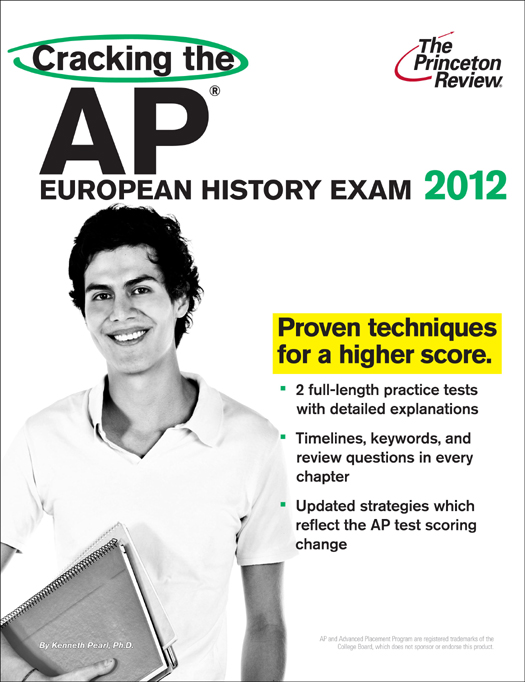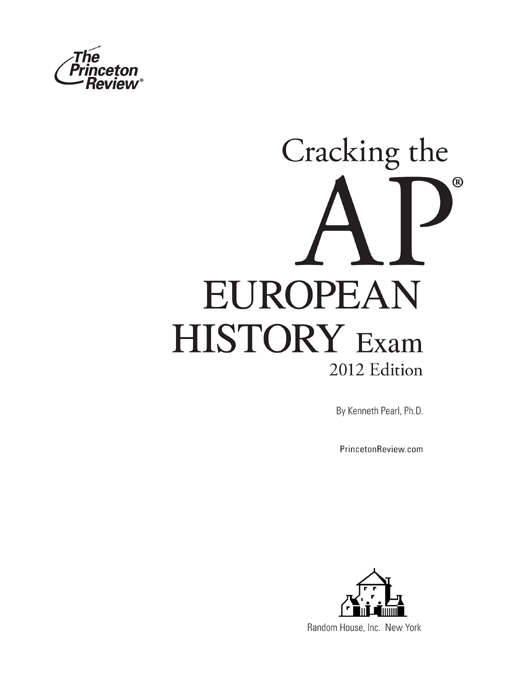Kenneth Pearl - Cracking the AP European history exam
Here you can read online Kenneth Pearl - Cracking the AP European history exam full text of the book (entire story) in english for free. Download pdf and epub, get meaning, cover and reviews about this ebook. City: New York, NY, year: 2012, publisher: Random House, genre: Romance novel. Description of the work, (preface) as well as reviews are available. Best literature library LitArk.com created for fans of good reading and offers a wide selection of genres:
Romance novel
Science fiction
Adventure
Detective
Science
History
Home and family
Prose
Art
Politics
Computer
Non-fiction
Religion
Business
Children
Humor
Choose a favorite category and find really read worthwhile books. Enjoy immersion in the world of imagination, feel the emotions of the characters or learn something new for yourself, make an fascinating discovery.

- Book:Cracking the AP European history exam
- Author:
- Publisher:Random House
- Genre:
- Year:2012
- City:New York, NY
- Rating:5 / 5
- Favourites:Add to favourites
- Your mark:
- 100
- 1
- 2
- 3
- 4
- 5
Cracking the AP European history exam: summary, description and annotation
We offer to read an annotation, description, summary or preface (depends on what the author of the book "Cracking the AP European history exam" wrote himself). If you haven't found the necessary information about the book — write in the comments, we will try to find it.
Cracking the AP European history exam — read online for free the complete book (whole text) full work
Below is the text of the book, divided by pages. System saving the place of the last page read, allows you to conveniently read the book "Cracking the AP European history exam" online for free, without having to search again every time where you left off. Put a bookmark, and you can go to the page where you finished reading at any time.
Font size:
Interval:
Bookmark:



Editorial
Rob Franek, VP Test Prep Books, Publisher
Seamus Mullarkey, Associate Publisher
Laura Braswell, Senior Editor
Selena Coppock, Editor
Heather Brady, Editor
Random House Publishing Team
Tom Russell, Publisher
Nicole Benhabib, Publishing Manager
Ellen L. Reed, Production Manager
Alison Stoltzfus, Associate Managing Editor
The Princeton Review, Inc.
111 Speen Street
Suite 550
Framingham, MA 01701
E-mail:
Copyright 2011 by The Princeton Review, Inc.
Cover design 2011 by Random House, Inc.
Cover art Andres Rodriguez/Alamy.
The Princeton Review is not affiliated with Princeton University.
All rights reserved. Published in the United States by Random House, Inc., New York, and in Canada by Random House of Canada Limited, Toronto.
eISBN: 978-0-307-94437-5
Editor: Heather Brady
Production Editor: Stephanie Tantum
Production Coordinator: Deborah A. Silvestrini
v3.1
Thank you to Jeff Soules for his careful review of the book.
The Princeton Review is an international test-preparation company with branches in all major U.S. cities and in several cities abroad. In 1981, John Katzman started teaching an SAT prep course in his parents living room. Within five years, The Princeton Review had become the largest SAT prep program in the country.
The Princeton Reviews phenomenal success in improving students scores on standardized tests is due to a simple, innovative, and radically effective philosophy: Study the test, not what the test claims to test. This approach has led to the development of techniques for taking standardized tests based on the principles the test writers themselves use to write the tests.
The Princeton Review has found that our methods work not just for cracking the SAT, but for any standardized test. Weve already successfully applied our system to the GMAT, LSAT, MCAT, and GRE, to name just a few. Although in some ways the AP European History test is a very different test from those mentioned above, in the end, a standardized test is a standardized test. This book uses our time-tested principle: Crack the system based on how the test is written.
We also offer books and online services that cover an enormous variety of education- and career-related topics. If youre interested, check out our website at PrincetonReview.com.
the System
Placement Program
The fact that you are reading this book means that you probably already know something about the Advanced Placement (AP) program. After all, how many people pick up a test-preparation guide for a little light reading? So, you probably already know that the AP courses at your high school are supposed to be the toughest available and also that at the end of the school year, you can take an AP exam that may allow you to earn college credit for your work in the course. However, you probably dont know the answers to the following questions: Who decides what constitutes an AP course? Are AP courses the same at every high school? Who writes and grades the AP exam? This section of the book answers these and other related questions.
The Advanced Placement program is coordinated by an organization called the College Board. The College Board oversees college admissions examinations. It also publishes test and course materials from previous years, holds seminars on college admissions, and sponsors educational research. Its membership is made up of college administrators, educators, and admissions officers, as well as high school administrators, guidance counselors, and teachers.
The College Board appoints a development committee for each of the subjects in which AP exams are available. Each committee meets to decide what should be covered in an AP course and what should be on the AP exam. The AP European History committee is made up of three high school history teachers and three college history teachers. Its decisions are included in a publication called AP European History Course Description, which is available online from the College Board. The book you are now reading includes all the pertinent information from that publication, so you dont really need it, but if you want to take a look at this booklet, download it online or ask your history teacher if he or she has a copy. Good history departments should have copies of all the important College Board AP publications. Because those publications are available for sale to the general public, theres no reason your teacher should refuse to let you see them. You can also find them on the College Boards website at www.collegeboard.com.
The AP European History development committee performs two important jobs: It updates the course description to reflect recent events and trends in historical analysis, and it writes the AP European History Exam. The committee very rarely makes major changes to the course or the test format. When the committee finishes writing each years exam, it hands it over to the Educational Testing Service(ETS), which prints up and administers the exam. Yes, these are the same folks who administer the SAT and many other admissions exams.
Most AP European History teachers have a copy of the development committees course requirements, which include an outline of everything a thorough European History course should cover (as well as suggested drills, reading assignments, paper topics, etc.). However, no one forces teachers to teach AP European History in a particular way; the committees requirements are actually more like suggestions. If you discuss your AP European History course with a friend taking the same course at a different school, you will likely find that his or her course is noticeably different from yours (especially if you are using different textbooks). Dont worry about these differences. There is no one right way to teach European History. Different teachers will interpret the meaning and importance of events differently. In that way, your AP European History course is similar to a college course.
Theres an obvious downside to taking AP classes: Theyre more difficult than regular classes. Compared with regular classes, AP classes involve more detailed lectures, more homework, more research papers, more tests, and, possibly, a lower grade. So, why take an AP course?
First, if youre looking to go to college, you want as many AP courses on your transcript as you can handle. These classes indicate to your prospective schools that youre serious about studying and challenging yourself. Many admissions offices will give your AP grade a one-level bumpthat is, they will consider your C a B. (Thats how some high school students end up with GPAs above 4.0: They get almost all As, including their AP courses.) College admissions officers are more favorably disposed to students who take AP courses.
Second, AP courses help you develop skills you will need in college. A good AP teacher will assign research papers and essay tests; require you to study primary source material, maps, census data, and lots of other resources beyond your textbook; encourage discussion of course material; and lecture in such a way that you have to take good notes to pass the course. All of these aspects of AP courses will help prepare you for your college courses.
Font size:
Interval:
Bookmark:
Similar books «Cracking the AP European history exam»
Look at similar books to Cracking the AP European history exam. We have selected literature similar in name and meaning in the hope of providing readers with more options to find new, interesting, not yet read works.
Discussion, reviews of the book Cracking the AP European history exam and just readers' own opinions. Leave your comments, write what you think about the work, its meaning or the main characters. Specify what exactly you liked and what you didn't like, and why you think so.

